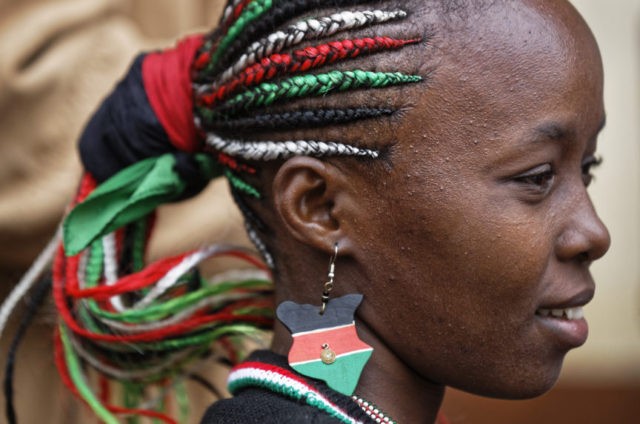NAIROBI, Kenya (AP) — The Latest on Kenya’s repeat elections. (all times local):
3:00 p.m.
The head judge of Kenya’s Supreme Court has traveled to his rural home to vote in the presidential election, one day after the court failed to muster enough judges to hear a last-minute petition seeking to postpone the vote.
Accompanied by his wife, Chief Justice David Maraga on Thursday voted in Nyamira County.
“I have finished my mission and I can now leave,” the Daily Nation newspaper quoted Maraga as saying.
On Wednesday, Maraga appeared alone at the Supreme Court and said only he and one other judge were able to attend the hearing on the petition. The driver for the court’s deputy chief justice was shot and wounded Tuesday evening, raising fears about intimidation of the judiciary.
___
2:20 p.m.
Kenyan police say one man shot by police during violent protests against the repeat presidential election has died at a hospital.
The shooting occurred in the city of Kisumu, an opposition stronghold. Three other people were admitted to a hospital with gunshot wounds.
An Associated Press journalist in Kisumu saw ambulances transporting several people from the protests.
___
1:40 p.m.
Kenya’s top police official says most of the country has been peaceful during Thursday’s repeat presidential election, although turnout is lower than in the Aug. 8 vote that the Supreme Court nullified over irregularities.
Joseph Boinnet, Kenya’s police inspector general, says there has been violence in parts of the Nairobi slums of Kibera and Mathare as well as in Kisumu, a major city that is an opposition stronghold.
Boinnet says the job of security forces is to protect voters and allow others who don’t want to vote “the space to enjoy that right.”
Opposition supporters are boycotting the election, saying it is not credible.
___
12:00 p.m.
Kenyan President Uhuru Kenyatta has voted in his hometown of Gatundu, saying that 90 percent of the country is calm and that he will work to unify the country if he is re-elected.
Kenyatta on Thursday said outside a polling station that Kenya must remove ethnic loyalties from its politics in order to succeed.
“What we have is a problem of tribalism, and tribalism is an issue that we must continue to deal with and fight with as we continue to develop our country,” Kenyatta said. “We cannot achieve our goals if we continue to embark on tribalistic politics.”
Many observers say Kenya’s ethnic-based politics overshadow the promise of its democracy. Kenyatta is from the Kikuyu group, while opposition leader Raila Odinga, who is boycotting Thursday’s election, is a Luo.
___
11:40 a.m.
Opposition leader Raila Odinga says the opposition will press for what it deems credible elections after boycotting Thursday’s repeat presidential election because of what it says is a lack of adequate reforms to the electoral commission.
Odinga’s challenge to the August elections, which were won by President Uhuru Kenyatta, led the Supreme Court to annul those results, citing illegalities, and order a repeat election.
Now Odinga is urging a boycott of Thursday’s elections. Odinga said Wednesday that the opposition coalition, National Super Alliance, will become a resistance movement.
A statement from Odinga Thursday says his movement will constitute a “People’s Assembly to guide the country to a fresh free and fair presidential election” as part of its peaceful resistance.
Odinga said the resistance will also include boycotting goods and services by those who have supported Kenyatta’s “lawless grab of the presidency.” He says Kenyatta’s push for an election, despite concerns overs its credibility even from the electoral commission’s chief, is due to the fact that he had alienated many voters and could only win an election unfairly.
Kenyatta’s is the leading candidate in Thursday’s election. Six other candidates on the ballot got less than one per cent in the nullified election in August.
___
10:55 a.m.
Kenyan police on Thursday fired tear gas at stone-throwing protesters in some opposition areas after the start of Kenya’s second presidential election since August, reflecting bitter divisions in a country whose main opposition leader urged his followers to boycott the vote.
Violence erupted in Nairobi’s Kibera slum and Kisumu, a major city in western Kenya where protesters set fires and blocked roads, and many polling stations didn’t open because of security concerns. One Kisumu primary school that saw huge lines of voters when it served as a polling station in Kenya’s Aug. 8 election was closed this time around, its gates locked.
Voting, meanwhile, proceeded in areas where President Uhuru Kenyatta has support, but fewer voters were turning out in comparison to the August election that the Supreme Court nullified because it found illegalities and irregularities in the election process.
Voters lined up before dawn at a polling station in Kenyatta’s hometown of Gatundu and electoral workers prepared ballot papers by flashlight after heavy rains knocked out power to the site.
Kenyatta, who was declared the winner in August with 54 percent of the vote, said in a televised address Wednesday that security forces would be deployed nationwide to ensure order, and he urged Kenyans to vote while respecting the rights of those who don’t.
Opposition leader Raila Odinga, who got nearly 45 percent in August, said the new vote won’t be credible because of a lack of electoral reform and accused Kenyatta of moving a country known for relative stability and openness toward authoritarian rule.
___
Associated Press journalists Christopher Torchia in Nairobi, Andrew Drake in Kisumu and Joe Mwihia in Gatundu, contributed to this report.

COMMENTS
Please let us know if you're having issues with commenting.